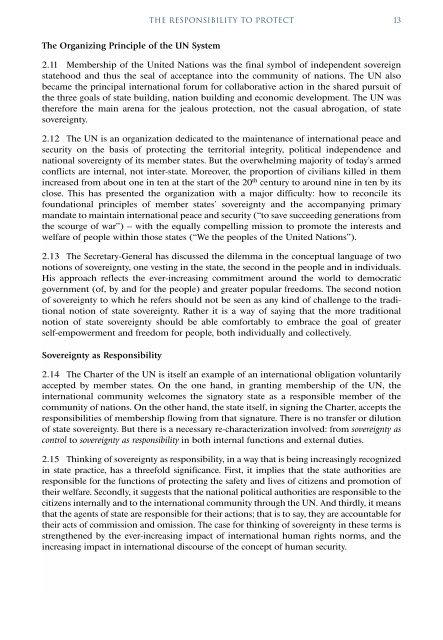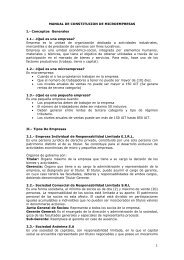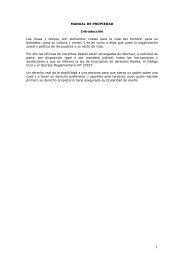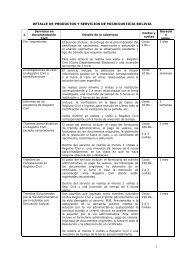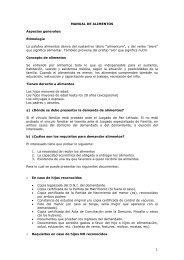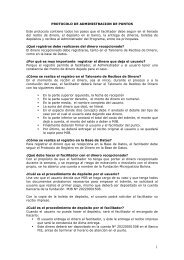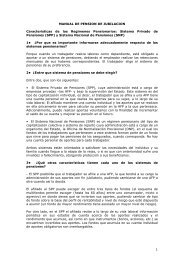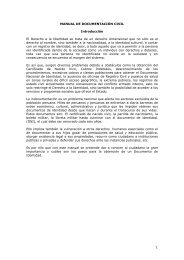ICISS report - International Coalition for the Responsibility to Protect
ICISS report - International Coalition for the Responsibility to Protect
ICISS report - International Coalition for the Responsibility to Protect
You also want an ePaper? Increase the reach of your titles
YUMPU automatically turns print PDFs into web optimized ePapers that Google loves.
The <strong>Responsibility</strong> <strong>to</strong> <strong>Protect</strong> 13<br />
The Organizing Principle of <strong>the</strong> UN System<br />
2.11 Membership of <strong>the</strong> United Nations was <strong>the</strong> final symbol of independent sovereign<br />
statehood and thus <strong>the</strong> seal of acceptance in<strong>to</strong> <strong>the</strong> community of nations. The UN also<br />
became <strong>the</strong> principal international <strong>for</strong>um <strong>for</strong> collaborative action in <strong>the</strong> shared pursuit of<br />
<strong>the</strong> three goals of state building, nation building and economic development. The UN was<br />
<strong>the</strong>re<strong>for</strong>e <strong>the</strong> main arena <strong>for</strong> <strong>the</strong> jealous protection, not <strong>the</strong> casual abrogation, of state<br />
sovereignty.<br />
2.12 The UN is an organization dedicated <strong>to</strong> <strong>the</strong> maintenance of international peace and<br />
security on <strong>the</strong> basis of protecting <strong>the</strong> terri<strong>to</strong>rial integrity, political independence and<br />
national sovereignty of its member states. But <strong>the</strong> overwhelming majority of <strong>to</strong>day’s armed<br />
conflicts are internal, not inter-state. Moreover, <strong>the</strong> proportion of civilians killed in <strong>the</strong>m<br />
increased from about one in ten at <strong>the</strong> start of <strong>the</strong> 20 th century <strong>to</strong> around nine in ten by its<br />
close. This has presented <strong>the</strong> organization with a major difficulty: how <strong>to</strong> reconcile its<br />
foundational principles of member states’ sovereignty and <strong>the</strong> accompanying primary<br />
mandate <strong>to</strong> maintain international peace and security (“<strong>to</strong> save succeeding generations from<br />
<strong>the</strong> scourge of war”) – with <strong>the</strong> equally compelling mission <strong>to</strong> promote <strong>the</strong> interests and<br />
welfare of people within those states (“We <strong>the</strong> peoples of <strong>the</strong> United Nations”).<br />
2.13 The Secretary-General has discussed <strong>the</strong> dilemma in <strong>the</strong> conceptual language of two<br />
notions of sovereignty, one vesting in <strong>the</strong> state, <strong>the</strong> second in <strong>the</strong> people and in individuals.<br />
His approach reflects <strong>the</strong> ever-increasing commitment around <strong>the</strong> world <strong>to</strong> democratic<br />
government (of, by and <strong>for</strong> <strong>the</strong> people) and greater popular freedoms. The second notion<br />
of sovereignty <strong>to</strong> which he refers should not be seen as any kind of challenge <strong>to</strong> <strong>the</strong> traditional<br />
notion of state sovereignty. Ra<strong>the</strong>r it is a way of saying that <strong>the</strong> more traditional<br />
notion of state sovereignty should be able com<strong>for</strong>tably <strong>to</strong> embrace <strong>the</strong> goal of greater<br />
self-empowerment and freedom <strong>for</strong> people, both individually and collectively.<br />
Sovereignty as <strong>Responsibility</strong><br />
2.14 The Charter of <strong>the</strong> UN is itself an example of an international obligation voluntarily<br />
accepted by member states. On <strong>the</strong> one hand, in granting membership of <strong>the</strong> UN, <strong>the</strong><br />
international community welcomes <strong>the</strong> signa<strong>to</strong>ry state as a responsible member of <strong>the</strong><br />
community of nations. On <strong>the</strong> o<strong>the</strong>r hand, <strong>the</strong> state itself, in signing <strong>the</strong> Charter, accepts <strong>the</strong><br />
responsibilities of membership flowing from that signature. There is no transfer or dilution<br />
of state sovereignty. But <strong>the</strong>re is a necessary re-characterization involved: from sovereignty as<br />
control <strong>to</strong> sovereignty as responsibility in both internal functions and external duties.<br />
2.15 Thinking of sovereignty as responsibility, in a way that is being increasingly recognized<br />
in state practice, has a threefold significance. First, it implies that <strong>the</strong> state authorities are<br />
responsible <strong>for</strong> <strong>the</strong> functions of protecting <strong>the</strong> safety and lives of citizens and promotion of<br />
<strong>the</strong>ir welfare. Secondly, it suggests that <strong>the</strong> national political authorities are responsible <strong>to</strong> <strong>the</strong><br />
citizens internally and <strong>to</strong> <strong>the</strong> international community through <strong>the</strong> UN. And thirdly, it means<br />
that <strong>the</strong> agents of state are responsible <strong>for</strong> <strong>the</strong>ir actions; that is <strong>to</strong> say, <strong>the</strong>y are accountable <strong>for</strong><br />
<strong>the</strong>ir acts of commission and omission. The case <strong>for</strong> thinking of sovereignty in <strong>the</strong>se terms is<br />
streng<strong>the</strong>ned by <strong>the</strong> ever-increasing impact of international human rights norms, and <strong>the</strong><br />
increasing impact in international discourse of <strong>the</strong> concept of human security.


